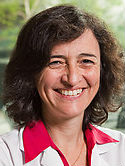Addressing communication challenges in older patients with cancer and geriatric syndromes: A communication skills training module for health care providers Journal Article
| Authors: | Alexander, K.; Banerjee, S. C.; Manna, R.; Alici, Y.; Nelson, C.; Gangai, N.; Shen, M. J.; Parker, P. A.; Korc-Grodzicki, B. |
| Article Title: | Addressing communication challenges in older patients with cancer and geriatric syndromes: A communication skills training module for health care providers |
| Abstract: | Aim: To describe the development, application and evaluation of a Communication Skills Traning Module for health care providers addressing Ageism, and sensory/physical impairments seen in older cancer patients. Findings: Training improved participants' self efficacy to communicate effectively. Participants demonstrated significant uptake of three skills- invite agenda, transition and normalize. Message: Our results show the successful development and application of a Geriatrics focused communication skills training program for health care providers. Purpose: Older adults frequently suffer from functional decline and sensory changes which, in turn, may trigger ageism, i.e., stereotyping and discriminating against individuals based on their age. Ageism commonly interferes with medical care. Communication strategies can be used to counteract ageism and to engage in optimal patient-centered care. This study describes the development, application, and evaluation of a communication skills training (CST) module (Geriatrics 101) designed to familiarize health care providers (HCPs) with the concept of ageism, and the frequent sensory and physical impairments in older patients with cancer, and to teach practical communication skills to effectively communicate with these patients. Methods: Geriatrics 101 is one of three modules in a 1-day CST program for HCPs, intended to improve the outcome of consultations through utilization of a set of clinically meaningful strategies. Study measures included post-training module evaluation, self-efficacy measured pre- and post-training, and communication skills uptake assessed pre- and post-training. Results: 97 clinicians participated over 2 years. Over 90% of participants rated the module favorably. Participants’ self-efficacy to communicate efficiently with older patients with impairments improved significantly from pre- (M = 3.52, SD 0.85) to post-module training (M = 4.26, SD 0.50). Participants also demonstrated significant uptake of three skills—invite agenda, transition, and normalize. Conclusion: The successful development and application of our program paves the way for future research that focuses on the evaluation of such geriatric-focused communication training in clinical settings, assessing patient-reported outcomes. © 2019, © 2019, European Geriatric Medicine Society. |
| Keywords: | communication skill; ageism; geriatric assessment; geriatric oncology |
| Journal Title: | European Geriatric Medicine |
| Volume: | 10 |
| Issue: | 2 |
| ISSN: | 1878-7649 |
| Publisher: | Springer |
| Date Published: | 2019-04-01 |
| Start Page: | 319 |
| End Page: | 326 |
| Language: | English |
| DOI: | 10.1007/s41999-018-00157-x |
| PROVIDER: | scopus |
| PUBMED: | 34652754 |
| DOI/URL: | |
| Notes: | Article -- Export Date: 1 May 2019 -- Source: Scopus |
Altmetric
Citation Impact
BMJ Impact Analytics
MSK Authors
Related MSK Work











